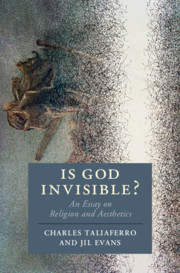Book contents
- Is God Invisible?
- Cambridge Studies in Religion, Philosophy, and Society
- Is God Invisible?
- Copyright page
- Contents
- Figures
- Web Figures
- Acknowledgments
- Introduction
- 1 Aesthetic Personalism
- 2 Is God Invisible?
- 3 The Gates of Perception
- 4 The Perception of Gates
- 5 The Beautiful Gate
- 6 Revealing and Concealing
- 7 Public Perception of Religious and Art Objects
- 8 A Personal Guide to the Aesthetic Experience of Works of Art
- Epilogue
- Index
Epilogue
Published online by Cambridge University Press: 30 March 2021
- Is God Invisible?
- Cambridge Studies in Religion, Philosophy, and Society
- Is God Invisible?
- Copyright page
- Contents
- Figures
- Web Figures
- Acknowledgments
- Introduction
- 1 Aesthetic Personalism
- 2 Is God Invisible?
- 3 The Gates of Perception
- 4 The Perception of Gates
- 5 The Beautiful Gate
- 6 Revealing and Concealing
- 7 Public Perception of Religious and Art Objects
- 8 A Personal Guide to the Aesthetic Experience of Works of Art
- Epilogue
- Index
Summary
The question that started our project, “Is God invisible?” took us into theological reflection on what might be meant by God being invisible and, just as importantly, what might be meant for our being invisible or visible to one another. We explored the religious worldviews of Judaism, Christianity, Islam, Hinduism, and Buddhism, and their secular alternatives in the three areas of aesthetics: aesthetic experience itself, the philosophy of beauty and ugliness, and the philosophy of art. In advancing aesthetic personalism, we have argued for the reality of embodied persons as enduring individuals with our distinctive aesthetic experiences and values. We have argued against defining persons and the transcendent so as to make it impossible for persons to have symmetrical experiences of God or the sacred. We propose that an omniscient or God’s-eye point of view (as we find in the Abrahamic idea of God, the omniscience of Brahman, and the Compassionate Buddha) provides an important challenge to oppressive, false narratives and supports a realist view of the good, the true, and the beautiful.
- Type
- Chapter
- Information
- Is God Invisible?An Essay on Religion and Aesthetics, pp. 171Publisher: Cambridge University PressPrint publication year: 2021

